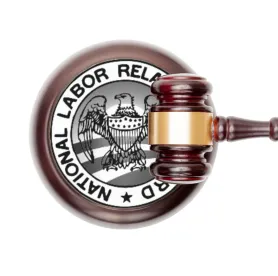The National Labor Relations Board (“NLRB” or “Board”) capped off an extremely busy week, by issuing another precedent-reversing decision, on the last day of Republican Member John Ring’s 5-year term. In Bexar County II, 372 NLRB No. 28, the Board revised the standard and thus limited the circumstances property owners can limit access to off-duty employees of an onsite contractor, overruling the standard adopted in Bexar County I, 368 NLRB No. 46 (2019) and returning to the test laid out by the NLRB more than 11 years ago, in New York, New York Hotel & Casino, 356 NLRB 907 (2011).
The case addresses whether property owners can lawfully bar non-employees from accessing their property to engage in protected union activity like leafletting, even if those non-employees work for an on-site contractor. This new standard is far more favorable to a contractor’s employee’s rights to access the property, because, to limit access, the property owner must demonstrate that:
-
The protected activity “significantly interferes” with the owner’s use of their property; or
-
The exclusion is justified by another legitimate business reason (such as the need for the property owner to maintain production and discipline).
The Previous Standard Under Bexar County I
In its 2019 decision, Bexar County I, the Board established a new standard that a property owner may lawfully prohibit the off-duty employees of its on-site contractors (or licensees) from accessing its property to engage in Section 7 activity unless (1) the off-duty employees regularly and exclusively work on the property, and (2) the property owner cannot show the off-duty employees do not have one or more reasonable non-trespassory alternatives for communicating their message. This decision strengthened private property owner rights when it comes to non-employees and Section 7 rights.
According to the Board, “regularly” meant that the contractor employee regularly performed services or conducted business on the owner’s property, and “exclusively” meant if contractor employees performed all of their work for that contractor on the owner’s property, even if they had a separate employer/job elsewhere.
While on appeal, the D.C. Circuit Court found that the Bexar County I standard was inconsistent and arbitrary in how it was applied to the workers in this case (which we reported on here), and remanded the case to the current Board, which set the table for this Board to potentially announce a new version of the test.
A Return to the New York, New York Standard
Aligning itself with the D.C. Circuit opinion on appeal, the Board found that the Bexar County I test “essentially strip[s] off-duty contractor employees whose employer does not own the property where they work from having Section 7 rights at their workplace.” Rather than modify the Bexar County I standard, the Board decided to abandon it altogether because it “fundamentally fails” workers’ rights under the NLRA. Instead, and in accordance with the General Counsel’s request, the Board adopted the New York, New York test, enunciated above.
In balancing the countervailing interests of a property owner’s right to exclude individuals from its premises with contractor employees’ rights to exercise Section 7 activities under the Act at their work location, the Board held that the New York, New York test more clearly and sufficiently protects Section 7 activity and promotes the Act’s underlying purposes.
Critical to its decision, the Board explained that, although off-duty contractor’s employees do not fit neatly into the text of Section 7, they are not outsiders to the property and should be protected by the Act to engage in Section 7 activities at their workplace. According to the Board, the owner’s property might be the only place that the contractor employees can effectively reach a small, specific audience through which they would like their messages on working conditions shared.
Further, the Board went out of its way to state that property owners can still fully protect their property interests without excluding the off-duty contractor employees—for example, the contractor-employer could agree to use its employment authority to enforce the property owner’s rules, or the property owner could exercise its “legitimate managerial interests” in preventing improper interference with its property.
As is typical, the Board announced that the New York, New York test applies to this case and to all pending cases before the Board.
Takeaways
This decision clearly affords greater rights to off-duty contractor-employees seeking to engage in Section 7 activity at their workplaces. Now, as it was prior to 2019, property owners have the burden of demonstrating the individuals’ conduct “significantly interferes” with the use of the property, or that legitimate business reasons (e.g., need to maintain operations, production or discipline) support the exclusion.
While the Board emphasized that the test endorsed in its Bexar II opinion does not eliminate property owners’ rights to exclude off-duty contractor employees, and instead, it places articulable limits on these rights that are easier for the Board and administrative law judges to apply than the Bexar County I test, the proof will ultimately be in how this standard will be applied.
As always, we will continue to monitor for updates.





 />i
/>i
